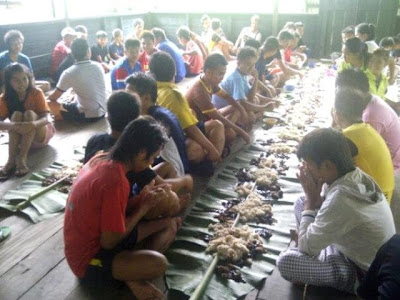
Ini adalah perutusan Tahun Baru 2012 oleh YAB Perdana Menteri Malaysia, Datuk Seri Mohd Najib Tun Razak yang dipetik dari blog rasmi beliau :
Alhamdullilah syukur ke hadrat Allah SWT kerana kita dapat menyaksikan tertutupnya tirai tahun 2011 dan menyinsingnya fajar baru 2012. Sesungguhnya 2011 merupakan tahun yang amat monumental kepada negara kerana ia telah menyaksikan lengkapnya “roll out” inisiatif dasar kerajaan di bawah payung Dasar Transformasi Nasional (2011-2020) dan dengan itu juga pengenalan siri keempat Rangka Rancangan Jangka Panjang Negara (RRJP) semenjak ia mula diperkenalkan pada tahun 1971. DTN merupakan komponen terakhir dalam usaha merealisasikan Wawasan Kebangsaan untuk menjadi sebuah negara maju berpendapatan tinggi menjelang tahun 2020.
DTN mempunyai permulaannya dengan pelancaran Program Transformasi Kerajaan (GTP) diikuti Program Transformasi Ekonomi (ETP) serta pelancaran Model Baru Ekonomi (NEM), Program Transformasi Politik (PTP) dan Program Transformasi Luar Bandar (RTP). Kesemua inisiatif dasar ini bukanlah sekadar pengumuman kosong mahupun tidak berpijak pada bumi yang nyata kerana jika dilaksanakan dengan betul dan mengikut jadual akan menyaksikan kemunculan sebuah Malaysia Baru. Sebuah negara yang bukan sahaja maju dari segi ekonomi dengan kemakmuran yang dikongsi setiap strata dan segmen rakyat tetapi juga sebuah watan dengan tradisi demokrasi serta perbezaan pendapat yang membina dan membugar.
Kerajaan tetap komited dengan program islah dan pembaharuan dalam semua bidang dan aspek kehidupan bernegara kerana inilah kehendak dan aspirasi rakyat yang mahukan kehidupan yang lebih baik untuk mereka dan anak-anak mereka. Inilah usaha demi Generasi masa depan Malaysia yang berhak membesar dalam suasana harapan bukannya kemuraman. Kita tidak akan tunduk kepada tekanan mana-mana pihak yang mahu menggagalkan matlamat mulia ini.
Di bawah PTP bagi mengimbangkan Keselamatan Kebangsaan dan Kebebasan Individu seperti yang terjamin dalam Perlembagaan Negara misalnya kita telah memansuhkan tiga proklamasi darurat yang berkuatkuasa semenjak lebih empat dekad yang lalu kerana kerajaan percaya kita tidak mampu membina sebuah Malaysia yang baru jika kita masih teperangkap dengan bebanan sejarah lampau. Dengan semangat yang sama kerajaan juga telah mengumumkan pemansuhan beberapa Akta yang berkaitan Keselamatan dan Ketenteraman Awam seperti Akta Keselamatan Dalam Negeri, Akta Kediaman Terhad, Akta Buang Negeri dan Seksyen 27 Akta Polis yang telah digantikan dengan Akta Perhimpunan Aman 2011 yang menjamin kebebasan individu untuk berhimpun secara aman seperti yang diperuntukkan undang-undang tertinggi negara Perlembagaan Persekutuan. Usaha ini akan diteruskan dalam sessi Parlimen seterusnya pada tahun 2012 bagi memansuhkan ISA dan membentang rang undang-undang baru yang akan menggantikannya serta meminda AUKU serta Akta Mesin Cetak dan Penerbitan.
Melalui bajet rakyat 2012 pula yang baru diluluskan Parlimen kerajaan hari ini juga telah meneruskan tradisi negara berkebajikan yang telah menjadi amalan kerajaan yang memerintah semenjak merdeka lagi. Kita tidak pernah melupakan nasib warga luar bandar mahupun warga bandar, golongan berpendapatan rendah mahupun kelas pertengahan serta mereka yang berpendapatan tinggi, kita akan sentiasa membela untung nasib seluruh rakyat Malaysia dan akan terus prihatin terhadap denyut nadi dan aspirasi mereka.
Marilah kita bersama-sama kerajaan dan rakyat merealisasikan masa depan yang lebih baik untuk bumi tercinta ini. Ia bukannya sebuah mimpi malahan ia dalam rangkulan kita jika kita sanggup merancang dengan teliti dan bekerja keras bagi mencapainya. Tidak ada yang mustahil jika kita mampu mengimpikannya, sesungguhnya hari-hari yang terbaik kita masih berada di hadapan kita bukannya sudah tinggal dalam lipatan sejarah. Selamat tahun Baru 2012, Dirgahayu Malaysia.










































































